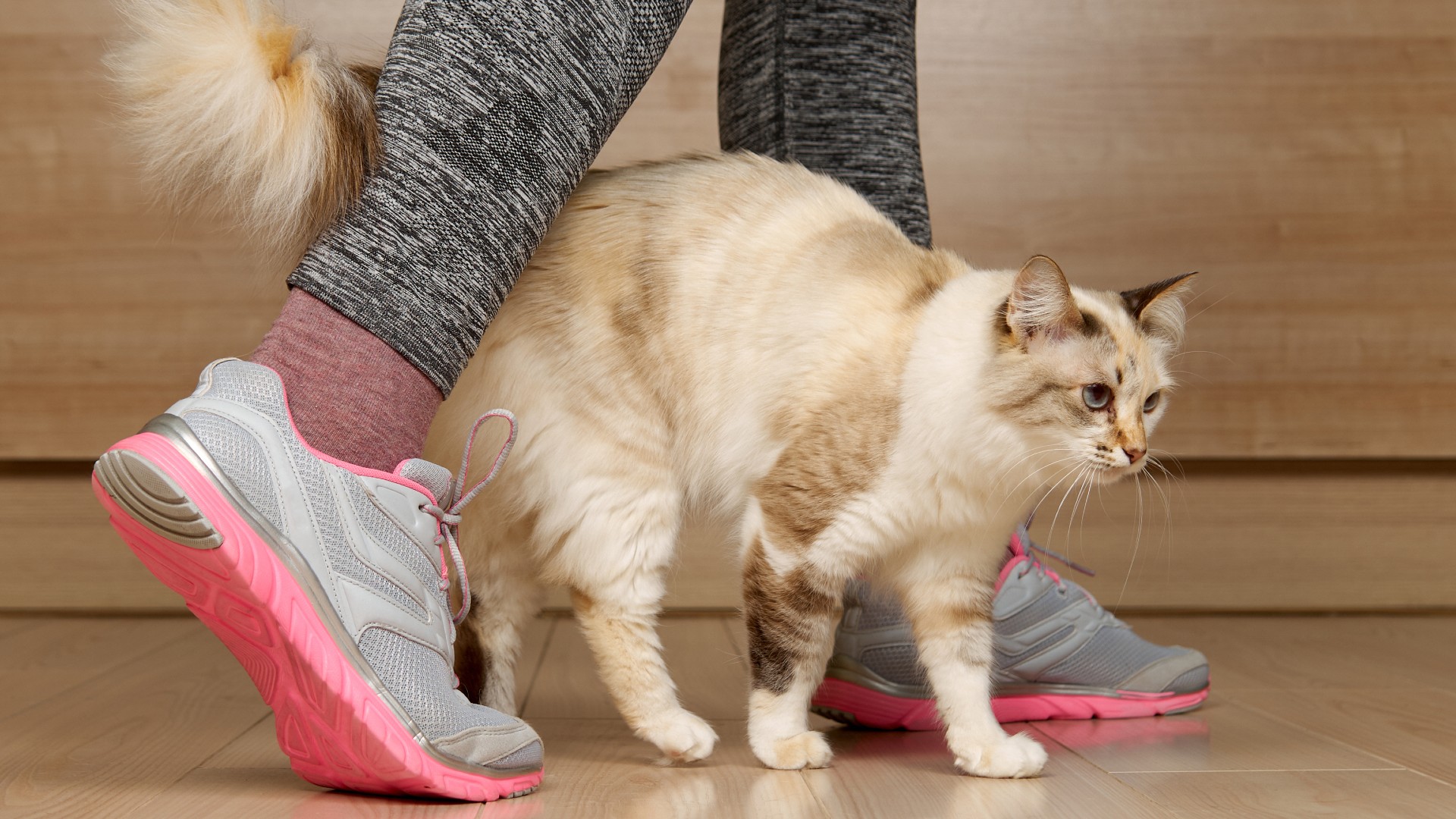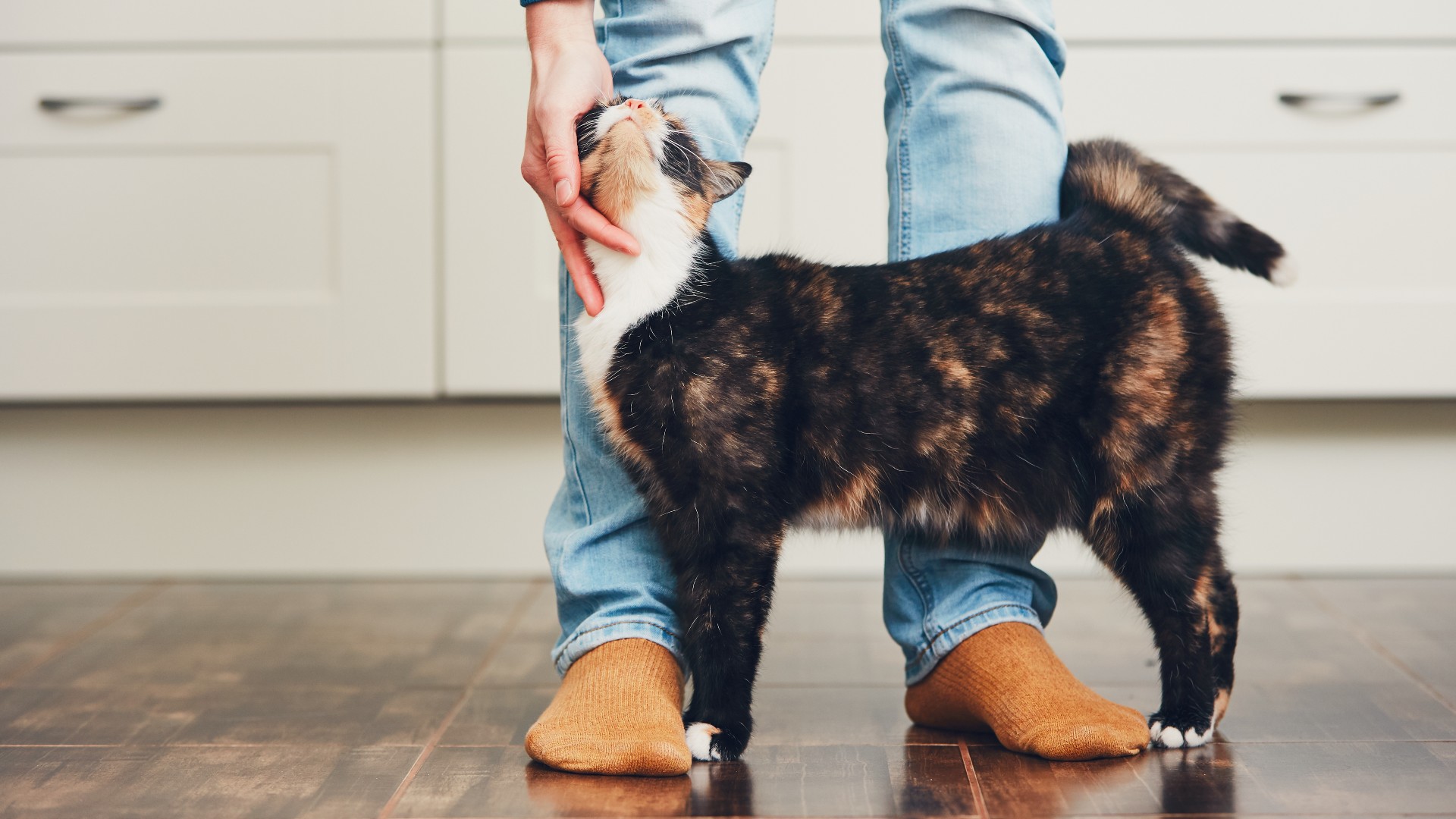Why do cats rub against you? 5 common causes and when to worry
From showing affection to claiming you as a member of their tribe, we answer the question 'why do cats rub against you?'

Why do cats rub against you? If you have a feline friend in your life, it’s one of many behaviors that has likely piqued your curiosity, and while it can certainly be a sign that they’re trying to get you to top up their bowl, there are several other reasons that your kitty may choose to rub up against you.
Cat communication can feel notoriously difficult to figure out at times, but the good news is that once you master it, you’ll soon become an expert on what your feline friend is trying to tell you. When it comes to rubbing up against you, rest assured that while it can mean several different things, it's almost always positive.
Rubbing is a behavior that’s passed down from mother to kitten and is used within the cat community as a sign of affection, to greet others in the feline family, to mark territory and as a way of communicating acceptance. Cats are likely to use rubbing in much the same way with humans as they would with others in their fur tribe.
Below, we walk you through the science behind rubbing behavior in cats and explore the five main most common reasons your cat is rubbing up against you. Plus, we reveal the signs to be on the lookout for that may indicate that your kitty's rubbing is a cause for concern.
Why do cats rub against you?
When it comes to communication, our feline friends rely heavily on scent as a way of getting their message across. Located around their cheeks, chin, top of their head and base of their tail, cats have a number of scent glands that contain what are known as pheromones. Cats use these pheromones as chemical messages to interact with the world around them.
To help you decipher what it is your kitty is trying to tell you, here are the most common reasons your fur baby is rubbing up against you:
1. Showing affection
Rubbing their body around your legs or engaging in head bunting, are the ultimate signs of affection where your cat is concerned and shows that they feel safe and secure around you.
2. To claim you as a member of their tribe
Cats are highly territorial creatures and not just when it comes to inanimate objects, they’re also very possessive of any human they consider to be a part of their tribe. Rubbing up against you is your feline friend's way of marking you with their scent and letting other cats know that you belong to them.
If you notice that your kitty often rubs up against you when you return home after having been out for the day, this is because the scent from the pheromones they release don’t last and need to be frequently reapplied in order for your cat to reclaim their territory. Marking you with their scent is also said to release endorphins, helping your furkid to feel calm and safe.
3. As a greeting
Have you ever come home from a long day at work or a night away and almost tripped over your feline friend as they tried to weave in and out of your legs? Both rubbing and head bunting are classic greeting signs your cat may use to let you know they missed you and are happy to have you back.

4. To signal they need something
Not all rubbing will be a sign of affection or territorial marking, sometimes your cat will rub up against you to let you know they want something. Whether they’re after their next meal or they want you to drag a few of the best cat toys out of the drawer and play with them, rubbing may be used to indicate a need.
It’s important to pay attention to the kind of rubbing your cat is using as this will help you decipher what it is they’re trying to tell you. If it’s persistent yet gentle (and perhaps accompanied by meowing) then it’s likely food, play or affection they’re after. More aggressive rubbing may be a sign of illness or a way of expressing displeasure if their litter box needs cleaning.
5. Creating a family scent
When it comes to keeping their family unified, that’s one job your feline friend takes very seriously - so much so that they want to make sure that all the members of their pack have one scent that groups them all together.
If your kitty is rubbing you and you begin to pet them, they’ll likely take this as a sign that you’re fully committed to actively participating in this family scent exchange and take great delight in the fact that you’re marking them back.
Should I worry if my cat is rubbing up against me all the time?
According to Dr. Mikel Maria Delgado, a certified animal behaviorist and cat behavior consultant, rubbing is rarely a cause for concern and is a very normal form of cat communication. “It’s one way they mark their territory, and rubbing can help cats feel safe,” she says.
Even if your cat is rubbing you or a particular item of furniture several times a day, Delgado says this isn’t anything to worry about. “Cats will often return to the same areas to ‘refresh’ their rubs,” she explains.
However, if your cat’s rubbing becomes aggressive and you notice it’s being accompanied by other changes in behavior, it’s important to take your kitty to the vet to get a checkup. Some signs to be on the lookout for, include:
- Increased vocalization
- Excessive grooming
- Changes in appetite or drinking behavior
- Moderate to severe itching and scratching
- Hair loss
- Weight loss
- Confusion
- Vomiting and/or diarrhea
Excessive rubbing can often be a sign of allergies, a flea infestation, ear infection, feline hypersensitivity disorder and intracranial disease, so if you’re at all concerned that your feline friend is rubbing compulsively, have a chat with your vet who will be able to offer advice and guidance.
If you’re wondering why do cats rub their face on things, check out this helpful feature. Or, discover the signs your cat loves you/
PetsRadar Newsletter
Get the best advice, tips and top tech for your beloved Pets

Kathryn is a freelance writer who has been a member of the PetsRadar family since it launched in 2020. Highly experienced in her field, she's driven by a desire to provide pet parents with accurate, timely, and informative content that enables them to provide their fur friends with everything they need to thrive. Kathryn works closely with vets and trainers to ensure all articles offer the most up-to-date information across a range of pet-related fields, from insights into health and behavior issues to tips on products and training. When she’s not busy crafting the perfect sentence for her features, buying guides and news pieces, she can be found hanging out with her family (which includes one super sassy cat), drinking copious amounts of Jasmine tea and reading all the books.
